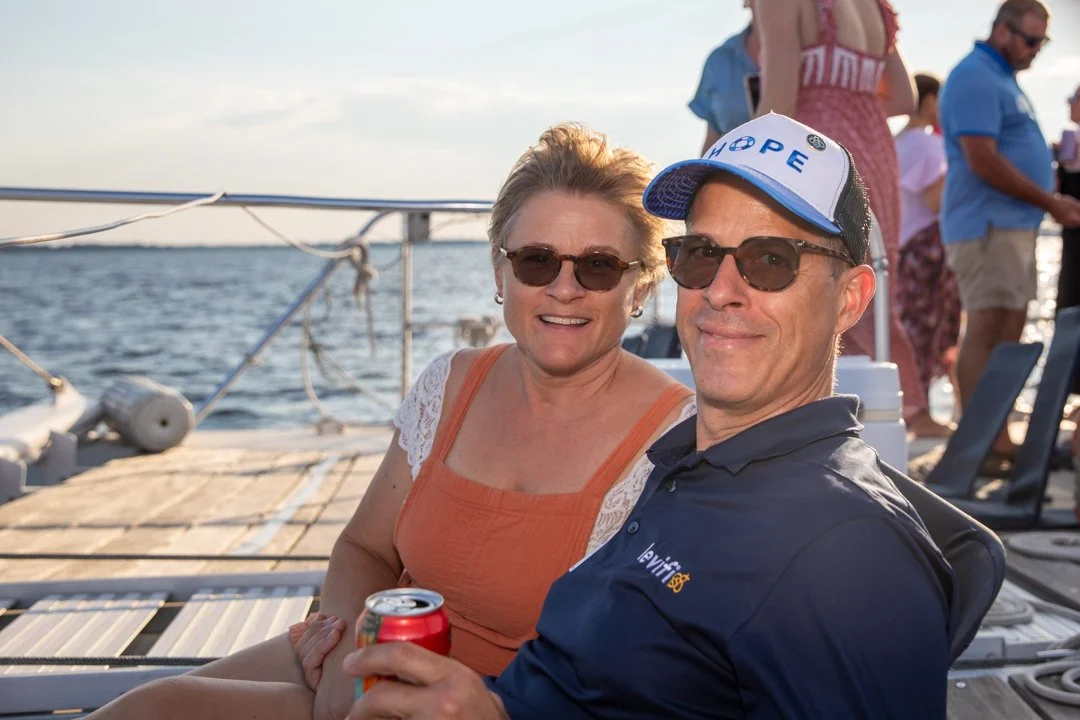EO Charleston Member Spotlight: Thomas Fimian
When it comes to customer service, every company insists they provide the highest quality of care for their customers. However, very few apply that mentality to the pillar of their very existence. Thomas Fimian and his business Levifi are always dedicated to providing “white glove” service. This is his tech industry story.
Thomas pictured with his wife Corian aboard Palmetto Breeze during EO Charleston’s annual sunset harbor cruise. 2024.
A New Start in the States
Fimian founded Levifi in 2002, just six years after moving to the United States with his wife from Switzerland.
“We barely knew each other when she had an offer to move over here, and we were separated longer than we were together,” he said. Fimian and his wife were apart in different time zones for seven months before he moved to the U.S. after finishing his military and work duties in Switzerland.
“My wife always dreamed of living and working in the U.S.,” he said. “I never really imagined leaving Switzerland, but love was stronger, and I followed her.”
Having helped fulfill his wife’s dreams, he then turned to his own– entrepreneurship.
“I always had kind of an entrepreneurial spirit,” he said. “I started as a little kid, going to flea markets and selling my toys.”
Fimian said he realized even at a young age that he loved making money and trading. So, naturally, once he got settled into the U.S., he landed his first job in sales at a Xerox agency in Sumter, South Carolina. After five years in Sumter, he bought his own agency in Charleston, which still lives today as Levifi.
“We started with basically three people: two sales guys, an administrator and myself,” he said. “And over the last 22 years, we’ve built ourselves into what I would say is a “real business” with over 80 team members and nine branches.”
The entrepreneur says his market of choice is workplace technology, which provides the tools and services that make workplaces function.
Changing With the Times
Fimian described his transition with Levifi as a natural progression. He credits his first U.S. job as a Xerox sales agent with launching him into the industry.
“We were called Charleston Copier and Fax,” he said, describing the company he acquired in 2002. “And for the first 10 to 12 years, we just did that and were successful.”
Thomas initially liked Xerox’s hands-off approach to billing and customer service, but over time, he desired to work with clients directly.
“To really take charge of your own destiny in business, you have to take charge of the whole customer experience,” he said.
Fimian gradually transitioned from an agency to a dealer model, choosing to run everything in-house. Thomas said this shift allowed the company to expand into more services, diversify the team, and dramatically improve the customer experience.
The first rebranding took place in 2005 when using the geographically focused company name Charleston Copier, and Fax became impractical as the business expanded into new markets. Under the brand name Docugraphics, the business expanded to nine branches in three states. As the business focus evolved from a copier/printer-focused business to an IT-centric workplace technology provider, the company rebranded to Levifi at the beginning of 2024.
White Glove Treatment
Levifi's vision is to treat its partners with white gloves. This white glove treatment goes beyond how customers are treated and includes how they interact with their team members and vendor partners.
The name Levifi and its image (a honeybee) were chosen to align the brand name with its long-term strategy and core values. Levifi did not want to be pigeonholed into a name associated with an industry or technology that might be outdated in the future.
Levifi has become a verb (“to elevate a customer’s work environment with awesome workplace technology”), and its bee image represents the core values of teamwork, integrity and innovation.
Fimian credits these core values to Levifi's success and continued growth. He said the transformation from a single-function sales business to a comprehensive tech service organization has also affected his personal life.
“I wasn’t a builder when I started in business. I was just a sales guy,” Thomas said. “And it morphed into my life to where I am open to doing much more now than ever before.”
Building serves a double meaning for Thomas, as one of his current passion projects is renovating a 100-year-old stone cabin in Asheville. He said his confidence as an entrepreneur motivated him to chase his dreams every day, and that’s the same advice he gives to young entrepreneurs today.
“Follow your heart, but have a good business plan, be disciplined,” he said.

